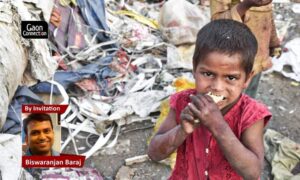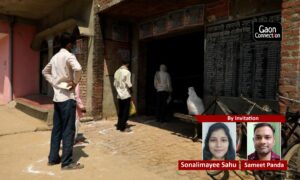As the country went into lockdown last year, many Indian women not only fought to sustain themselves and their families, but also had to contend with growing menstrual challenges. The pandemic disrupted the supply of sanitary pads, education on menstruation, and medical care in rural India. On the surface, it might appear that the lack of access and affordability of pads are the primary concern for menstrual hygiene management, however digging deeper, other reasons emerge.
ASHA workers grappled with the waning stocks of sanitary pads while the closure of schools meant that young girls lost valuable sources of guidance and free supply for menstrual products. The ‘essential’ items list released by the government on March 24, 2020 did not include sanitary pads, and were only added later on March 30. Moreover, informal sector incomes were badly hit and low-income households that ran on daily income with little to no savings started viewing sanitary pads as ‘luxury goods’.
Also Read: Rags to pads: Young tribal women of Rewa, Madhya Pradesh successfully script the switchover
The challenges of menstrual health in rural India
The use of sanitary pads is not the only way of hygienically managing menstruation. The National Family Health Survey report found that 57.6 per cent of young Indian women (aged 15-24 years) used hygienic means of managing menstruation. For instance, cloth is widely used by women in rural India due to its affordability, familiarity and ease and as of 2019, 66 per cent of India’s population lives in rural areas. When cloth pads are properly washed and dried out in the sun, they can be a hygienic and sustainable way of managing menstruation. However, since many rural households lack a private toilet — women must deal with the discomfort of washing this cloth in public, or in toilets that may not have appropriate sanitation.
Moreover, in India, the taboos attached to menstruation still run rampant due to which women feel the need to “hide” their cloth and store them in private. As a result, they might take to washing it elsewhere or drying it in a damp, secluded space—potentially leading to the build up of bacteria and as a result, avoidable infections.
Additionally, if women use disposable menstrual products, their disposal in rural areas poses great challenges, due to the lack of dustbins and waste collection systems. Most often, women either burn their menstrual waste or bury them in shallow holes in the ground. Both these methods of disposal can be toxic due to the fumes caused by burning, and the danger of animals digging up the waste or leakages into the soil.
Menstrual taboo, misconceptions and the need for open dialogue
Outside of the lack of privacy and infrastructure, some women also face menstrual health issues that may require medical intervention. However, given the closure of several clinics and the fear of going to a doctor during Covid-19—such health issues might go unheard. Others might struggle with tele-consultations and finding medication due to lack of connectivity and closure of pharmacies. Some may also hesitate to discuss these health concerns in light of the taboo around openly talking about menstruation while others may not be aware of the kind of menstrual abnormalities to look out for.
Also Read: Adolescents in Rajasthan villages discuss periods and reproductive health, shattering taboos
In an attempt to establish the baseline level of menstrual knowledge amongst young girls (aged 9-13 years) from low-income households, a study found that there was a lack of awareness and varying misconceptions. The questions about menstruation submitted by the sample group indicated that many didn’t know about hygienic menstrual practices alongside the usage and disposal of sanitary pads. The findings also support earlier studies claiming that adolescent girls in middle to low-income countries “silently suffer some degree of pain, cramping, and discomfort associated with dysmenorrhea”. In doing away with taboos and misinformation, we can ease feelings of self-doubt or fear that young women may face when menstruating—helping them achieve their full potential and play active roles in the socio-economic space.
A one-call solution
The Aarogya Saathi project, initiated by Uninhibited in partnership with 5 Cluster Level Federations (CLFs), facilitated by Transform Rural India Foundation (TRIF), launched an emergency menstrual health helpline with the intent of making menstruation a non-issue during Covid-19. One badlav didi, or a health change sister, in the village of Ganga Khedi in Jhabua, Madhya Pradesh, talks about going door to door to ask women if they were facing any menstrual health issues and to circulate the helpline number. In personally vouching for and spreading awareness about this project, Savita didi is slowly but surely creating familiarity with the helpline so that more women can trust it to be a safe space for them. While information campaigns and disseminating scientific facts to demystify menstrual taboos and misconceptions are helpful, there can often be a disconnect in its on-ground reach—alienating many from the conversation.
Helpline assistants speak local languages such as Hindi, Tamil and Kannada and ensure that callers feel comfortable and directly involved in the conversation. The helpline refers callers to a free tele-gynecology consultation in case of a clinical health issue. Hello Saheli also invites men into the conversation with a gender counselling component: to validate the Covid-19 stressors in their lives while shedding light on stressors for their partners and how best to support them. This is with the aim of shattering the belief that menstrual health is only a “woman’s problem” so only hers to deal with, because it’s only when we make it our problem that women will be able to experience menstruation in a comfortable, safe and dignified way.
In conversation, Savita didi mentions that the women in her village have started to discuss menstruation openly. Not only have conversations started amongst women, but also with their children and their elderly mothers. Women have taken the initiative to educate the elders of the village about menstruation, as well as other women’s issues relating to the uterus. One woman from Ganga Khedi also came forward saying that the helpline saved her from going through a surgery to remove her uterus as a tele-gynecology consultation suggested an alternative to cure her of her ailments through medicines. More so, numerous women from neighboring villages also reported having lesser discomfort and menstrual cramps as the helpline suggests ways to deal with the menstrual cramps and pains. This has also resulted in women missing lesser days of work every month.
Going Forward
Opening up conversations around menstruation and removing taboos associated with the subject will have a multifold impact on rural communities in India. Not only does it reduce the chances of infection and disease for women, it also improves hygiene and sanitation practices and can indirectly reduce gender inequality. By having the correct information and knowledge of issues relating to women and their health, the challenges of childbirth, conception, menopause and more can be discussed more openly, with both men and women.
Currently, the helpline is being extensively used in Petlawad block of Jhabua District in Madhya Pradesh, but TRIF has plans to expand it to other blocks for which the Department of Women and Child Development has issued a letter to all administrative blocks to start outreach in association with the Panchayati Raj Department.
Vanya Gupta is a consultant at the Transform Rural India Foundation. She has experience of working in the public policy and development sector, and has a background in research and communications.
Views are personal.


















